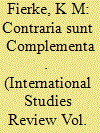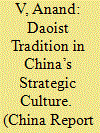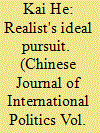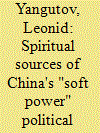|
|
|
Sort Order |
|
|
|
Items / Page
|
|
|
|
|
|
|
| Srl | Item |
| 1 |
ID:
164456


|
|
|
|
|
| Summary/Abstract |
The physicist Niels Bohr identified a parallel between quantum physics and Daoism and Buddhism. This parallel maps onto two debates regarding global IR, on the one hand, and the implications of quantum physics for the social sciences, on the other, highlighting the potential for a conversation between them. The quantum arguments unsettle the hierarchy between “positivists” and “reflectivists,” raising a question of which science, while Daoism and Buddhism, as traditions that have for millennia explored questions of language, agency and ethics, provide a framework for beginning to think about the human and social implications of more recent discoveries in quantum physics. Starting with Bohr's concept of complementarity, the argument moves to an analysis of Karen Barad and Alexander Wendt's work on quantum physics and the social sciences and then explores Bohr's parallel to Daoism and Buddhism. The structuring of the article around a series of oppositions, including particle/wave, ontology/epistemology, materiality/consciousness, egoism/relationality, and East/West highlights the relationship between global entanglement and the constitution of difference with it.
|
|
|
|
|
|
|
|
|
|
|
|
|
|
|
|
| 2 |
ID:
166612


|
|
|
|
|
| Summary/Abstract |
In the South China Sea, China neither implements power-maximizing policy nor engages a peaceful approach. Instead, China implements both coercion and cooperation in pursuing its strategic interest in the disputed area. How can we explain China’s paradoxical behavior? This article claims that the best way to explain China’s policy in the South China Sea is to understand the character of dualism in China’s strategic culture. Following constructivist theory that stresses culture, this article argues that Chinese duality approach in the South China Sea is rooted in the philosophy of Daoism. The symbol of Yin-Yang depicts Chinese assertive as well as cooperative behavior in dealing with the South China Sea dispute. Although from a normative perspective Daoism recognizes pacifism and non-violent behavior, the most important feature of Daoism is the assumption that reality consists of two opposing elements that are mutually embedded.
|
|
|
|
|
|
|
|
|
|
|
|
|
|
|
|
| 3 |
ID:
175319


|
|
|
|
|
| Summary/Abstract |
China’s strategic culture has mostly been understood from the competing prisms of Confucianism and realpolitik traditions. However, there is a need to go beyond this binary approach to explore the more nuanced civilisational basis of China’s strategic thinking. It is in this context that the role of Daoism becomes significant in understanding China’s behavioural patterns. The Daoist strategic tradition has been found to be a highly cogent system based on five key pillars—strategic rationalism, strategic aloofness, strategic optimisation, strategic restraint and strategic flexibility. These aspects have been found reflected in various key instances of China’s strategic practice, demonstrating its relevance for understanding China’s strategic culture.
|
|
|
|
|
|
|
|
|
|
|
|
|
|
|
|
| 4 |
ID:
151476


|
|
|
|
|
| Summary/Abstract |
This article investigates the adoption of Daoist ritual among the Yao peoples in South China and mainland Southeast Asia. The Song Dynasty imperial court patronized new Daoist ritual traditions that harnessed martial deities such as the Thunder Gods. Although these traditions were mostly southern in origin, it is not until the Qing dynasty that we find evidence for their circulation among the Yao. After discussing historical representations of Yao religion from the Song to the Qing dynasty and the specific historical contexts that gave rise to each representation, I conclude by examining how beliefs and practices derived from these same Daoist ritual traditions were active among the Iu Mien in Laos during the Second Indochina War. What is needed is an analysis that links a specific ethnographic or historiographic representation with a broader understanding of local, regional, and even transnational ritual practices in the borderlands of China and Southeast Asia.
|
|
|
|
|
|
|
|
|
|
|
|
|
|
|
|
| 5 |
ID:
114903


|
|
|
|
|
| Publication |
2012.
|
| Summary/Abstract |
It is no exaggeration to say that Yan Xuetong's Ancient Chinese Thought,
Modern Chinese Power is a path-breaking project that integrates ancient
Chinese philosophy, Pre-Qin history, and contemporary International
Relations (IR) theory. Although Yan has not introduced a new grand
theory of IR in the book per se, he has paved a fresh theoretical and intellectual path to reforming current, western-philosophy-and-history-based IR
theory. If scholars follow Yan's guidance and approach as laid out in the
book, it will be no surprise to see developed more than one new IR theory.
|
|
|
|
|
|
|
|
|
|
|
|
|
|
|
|
| 6 |
ID:
151268


|
|
|
|
|
| Summary/Abstract |
The author analyzes the philosophical sources of the "soft power" strategy formation as one of the major components of the modern China political orientation. The PRC demonstrates notable achievements in the economic, political, social, and cultural spheres. The article also examines Daoism, Confucianism, and Buddhism, which exerted great influence on the formation of the "soft power" concept principles in China, and shows the use of these teachings for political influence on neighboring countries.
|
|
|
|
|
|
|
|
|
|
|
|
|
|
|
|
|
|
|
|
|